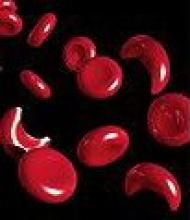User login
ORLANDO – Hydroxyurea therapy was associated with an overall cumulative survival rate of 70% in children aged 3 to 18 years with sickle cell disease.
Hydroxyurea is routinely used to treat adults with sickle cell disease, but it has not been well studied in children, Dr. Clarisse Lobo of the Instituto Estadual de Hematologia Arthur de Siqueira Cavalcanti in Rio de Janeiro, Brazil, said at a press conference. Although deaths among children in the United States and Europe have decreased substantially, high mortality is still an issue in developing nations.
In a study presented Dec. 6 at the annual meeting of the American Society of Hematology, Dr. Lobo and her colleagues reviewed data from 224 children who met the criteria for hydroxyurea treatment over a 10-year period. No genotypes of sickle cell disease were excluded.
The cumulative survival rates at 10 years and 17.9 years of age were 99% and 97%, respectively, in hydroxyurea-treated children, compared with 97% and 66% in 965 untreated children (P = .027). A total of 46 deaths occurred during the study period. Only two of these occurred in hydroxyurea-treated children, and both were due to acute chest syndrome.
The treatment was significantly associated with a 68% reduction in hospitalizations, a 49% reduction in emergency department visits, and a 36% reduction in transfusions in children with sickle cell disease who were treated with hydroxyurea, compared with untreated children.
The starting dose of hydroxyurea was 15 mg/kg/day, escalated up to a maximum dose of 30 mg/kg/day. The median dose was 20 mg/kg/day, and the median treatment duration was 1.9 years.
Although the study was limited to children in Brazil, the results support the value of hydroxyurea for reducing mortality in children with sickle cell disease.
Dr. Lobo had no financial conflicts to disclose.
ORLANDO – Hydroxyurea therapy was associated with an overall cumulative survival rate of 70% in children aged 3 to 18 years with sickle cell disease.
Hydroxyurea is routinely used to treat adults with sickle cell disease, but it has not been well studied in children, Dr. Clarisse Lobo of the Instituto Estadual de Hematologia Arthur de Siqueira Cavalcanti in Rio de Janeiro, Brazil, said at a press conference. Although deaths among children in the United States and Europe have decreased substantially, high mortality is still an issue in developing nations.
In a study presented Dec. 6 at the annual meeting of the American Society of Hematology, Dr. Lobo and her colleagues reviewed data from 224 children who met the criteria for hydroxyurea treatment over a 10-year period. No genotypes of sickle cell disease were excluded.
The cumulative survival rates at 10 years and 17.9 years of age were 99% and 97%, respectively, in hydroxyurea-treated children, compared with 97% and 66% in 965 untreated children (P = .027). A total of 46 deaths occurred during the study period. Only two of these occurred in hydroxyurea-treated children, and both were due to acute chest syndrome.
The treatment was significantly associated with a 68% reduction in hospitalizations, a 49% reduction in emergency department visits, and a 36% reduction in transfusions in children with sickle cell disease who were treated with hydroxyurea, compared with untreated children.
The starting dose of hydroxyurea was 15 mg/kg/day, escalated up to a maximum dose of 30 mg/kg/day. The median dose was 20 mg/kg/day, and the median treatment duration was 1.9 years.
Although the study was limited to children in Brazil, the results support the value of hydroxyurea for reducing mortality in children with sickle cell disease.
Dr. Lobo had no financial conflicts to disclose.
ORLANDO – Hydroxyurea therapy was associated with an overall cumulative survival rate of 70% in children aged 3 to 18 years with sickle cell disease.
Hydroxyurea is routinely used to treat adults with sickle cell disease, but it has not been well studied in children, Dr. Clarisse Lobo of the Instituto Estadual de Hematologia Arthur de Siqueira Cavalcanti in Rio de Janeiro, Brazil, said at a press conference. Although deaths among children in the United States and Europe have decreased substantially, high mortality is still an issue in developing nations.
In a study presented Dec. 6 at the annual meeting of the American Society of Hematology, Dr. Lobo and her colleagues reviewed data from 224 children who met the criteria for hydroxyurea treatment over a 10-year period. No genotypes of sickle cell disease were excluded.
The cumulative survival rates at 10 years and 17.9 years of age were 99% and 97%, respectively, in hydroxyurea-treated children, compared with 97% and 66% in 965 untreated children (P = .027). A total of 46 deaths occurred during the study period. Only two of these occurred in hydroxyurea-treated children, and both were due to acute chest syndrome.
The treatment was significantly associated with a 68% reduction in hospitalizations, a 49% reduction in emergency department visits, and a 36% reduction in transfusions in children with sickle cell disease who were treated with hydroxyurea, compared with untreated children.
The starting dose of hydroxyurea was 15 mg/kg/day, escalated up to a maximum dose of 30 mg/kg/day. The median dose was 20 mg/kg/day, and the median treatment duration was 1.9 years.
Although the study was limited to children in Brazil, the results support the value of hydroxyurea for reducing mortality in children with sickle cell disease.
Dr. Lobo had no financial conflicts to disclose.
FROM THE ANNUAL MEETING OF THE AMERICAN SOCIETY OF HEMATOLOGY
